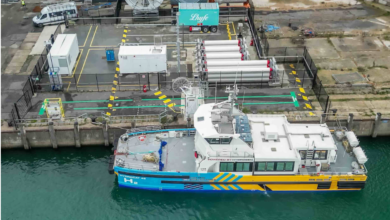Europe’s first landside-to-airside hydrogen airport pipeline unveils
These milestone announcements represent significant hydrogen infrastructure advancement for ZeroAvia and the industry.

ZeroAvia, today (10th May) announced collaboration with its strategic investor Shell, who will design and build two commercial-scale mobile refuelers for use at ZeroAvia’s research and development site in Hollister, California.
The announcement follows recent positive predictions relating to the falling price trajectory of hydrogen fuel and a flurry of State-led activity for establishing H2 Hubs as the Department of Energy prepares to receive bids from across the US.
At ZeroAvia’s test facility in Hollister, Shell will also provide compressed, low-carbon hydrogen supply to the facility and other locations in the Western US. This strategic collaboration will support the development of ZeroAvia’s flight testing program in the US following its second Dornier 228 at Hollister last month and will advance the company’s Hydrogen Airport Refueling Ecosystem (HARE) on a larger scale.
ZeroAvia’s zero-emission powertrains use hydrogen fuel in a fuel cell to create a chemical reaction which produces electricity. That electricity then powers electric motors that spin the propellers while producing no emissions other than water.
The deal with Shell comes as ZeroAvia also unveils Europe’s first landside-to-airside hydrogen airport pipeline. The 100 meter long hydrogen pipeline runs alongside ZeroAvia’s hangar at Cotswold Airport in the UK. The company will utilize it alongside an electrolyzer and mobile refueler to use low-carbon hydrogen for its test flight program. The pipeline will help ZeroAvia demonstrate and explore the operational safety case for hydrogen pipelines and refueling infrastructure at airports.
ZeroAvia received support for the pipeline from the UK Government’s Department for Transport and the Connected Places Catapult as part of the Zero Emission Flight Infrastructure (ZEFI) program to enable airports and airfields to prepare for the future of zero-emission operations.
Both projects also enable ZeroAvia to further explore the connection between aircraft refuelling and landside hydrogen use cases, such as road transport. ZeroAvia operates multiple hydrogen fuel cell road vehicles as part of its operations at Cotswold Airport and Hollister, demonstrating the potential for airports to act as hydrogen hubs for onward transport and ground operations.
Oliver Bishop, GM, Hydrogen at Shell, said, “We believe ZeroAvia’s technology is a viable option, and this agreement will allow us to demonstrate successful provision of low-carbon hydrogen supply while supporting development of codes, standards, and refueling protocols for hydrogen-powered aviation.”
Arnab Chatterjee, VP Infrastructure, ZeroAvia, commented, “Hydrogen-electric aviation is the only practical, holistic, and economically attractive solution to aviation’s growing climate change impact.”
